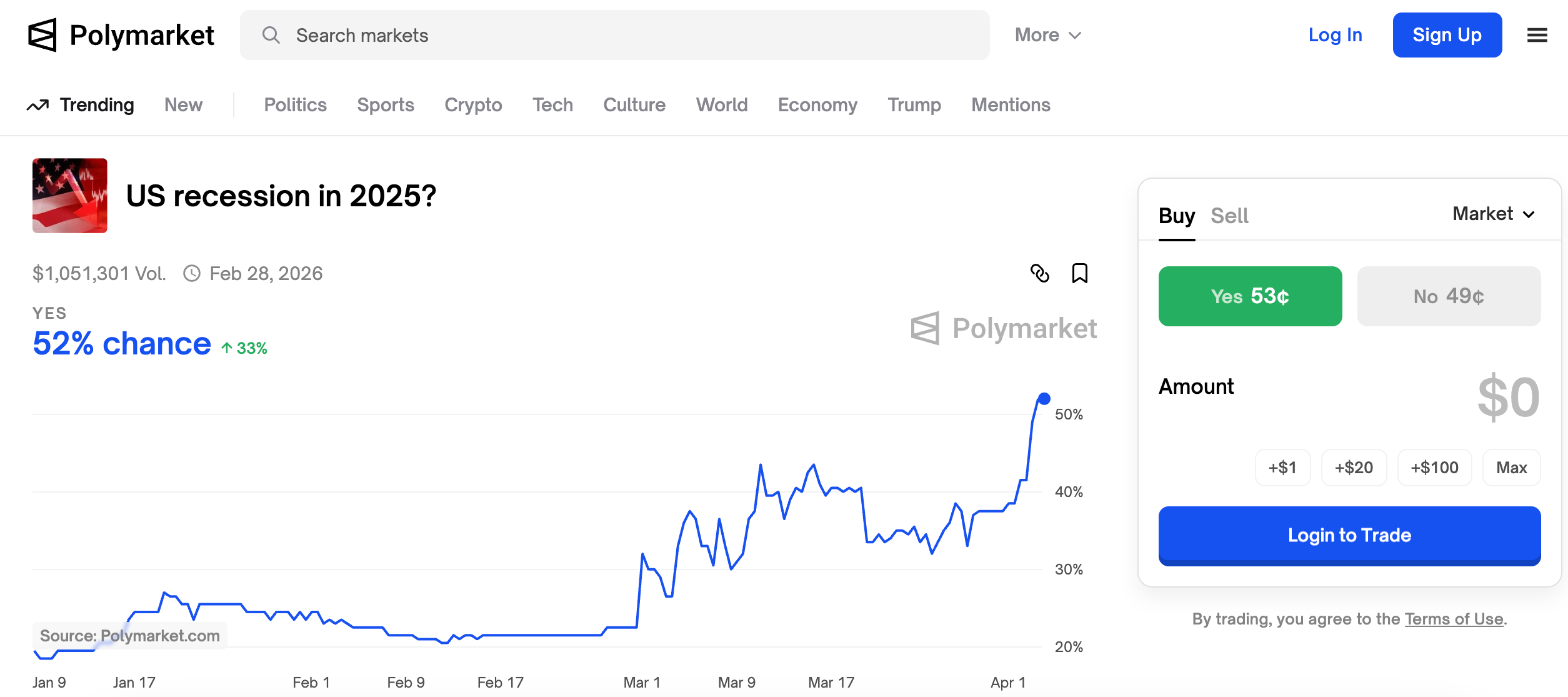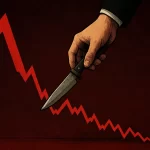Rising Fears of U.S. Recession Amid Tariff Announcement
Concerns about a potential recession in the United States have intensified following President Donald Trump’s recent tariff plan. Prediction platforms such as Polymarket and Kalshi have observed a significant uptick in fears that the economy may suffer as a result of these economic measures. On Polymarket, a decentralized prediction market, the likelihood of the U.S. entering a recession in 2025 surged past 50% for the first time since trading on this betting contract commenced earlier this year. The “US Recession in 2025” contract saw its Yes shares jump from 39 cents to over 50 cents in less than 24 hours. This contract will resolve as Yes if the National Bureau of Economic Research (NBER) officially declares a recession before December 31, contingent upon experiencing consecutive quarterly declines in gross domestic product (GDP).
Similarly, Kalshi, a regulated prediction market based in the U.S., indicates that traders are increasingly worried about the economy, with the probability of a recession occurring in 2025 rising from 40% to 54%. Financial markets are known for their forward-looking nature, and the escalating odds of a U.S. recession may prompt declines in risk assets, including bitcoin (BTC) and other cryptocurrencies. At the time of this report, S&P 500 futures were down 3%, reflecting significant risk aversion on Wall Street, which in turn negatively impacted bitcoin, trading at $83,100—down 1.5% over the past 24 hours.
The recently announced tariffs establish a base rate of 10% on all imports, with additional higher taxes imposed on 60 nations identified as major offenders. China, the most impacted country, faces a staggering 34% levy on top of the existing 20% tariff, bringing its total to a remarkable 54%. These base tariffs are set to take effect on April 5, with the increased reciprocal rates following on April 9.
While the Trump administration anticipates that these tariffs will help correct the persistent U.S. goods trade deficits, there is concern that they could exacerbate domestic inflation and contribute to global instability in the short term. This instability could arise quickly if countries like China and members of the European Union retaliate with their own tariffs, potentially igniting a full-scale global trade war.
Could Risk Aversion Be Short-Lived?
Despite these concerns, some analysts are suggesting that the uncertainty surrounding the tariffs might only result in an economic slowdown rather than a full-blown recession. UBS, in a recent blog post, stated, “The threat of further tariff escalation remains a key concern, but our economic forecasts do not predict a recession in the U.S.” They believe that a broad spectrum of selective tariffs and counteractions may lead to slower economic growth compared to last year but should not prevent the U.S. economy from expanding at approximately 2%—its historical trend rate—this year.
On the financial markets front, some experts argue that the tariffs could be interpreted as dovish, implying that the initial risk-off sentiment may be fleeting and could soon be counterbalanced by expectations of interest rate cuts from the Federal Reserve. Joseph Wang, the operator of the research portal fedguy.com, emphasized this point on X, recalling a prior post from November that explained how significant tariffs would likely lead to increased rate cuts. Wang posits that while tariffs may introduce inflationary pressures, these effects can be moderated through fluctuations in foreign-exchange rates and are ultimately temporary. However, the long-term impact on business sentiment could be detrimental, potentially leading to higher unemployment levels—something the Federal Reserve would seek to avoid.
Traders in the rates market are already factoring in a greater likelihood of the Fed reducing the benchmark borrowing rate by June, which would signal the commencement of a new easing cycle following the one that began in September of the previous year.






